It is true and cannot be overlooked
any longer, our ranks are shrinking; but still we work on
keeping our grassroots organizations alive. Radio programs have
disappeared from the airwaves, local German television has not
existed in more than a decade, and only the publication of
printed papers has increased. That of course is not due to any
increase in readership or sponsors, but simply a matter of
tenacity and competition, and/or a lifestyle gotten used to,
coupled with an unwillingness to give it up.
Other areas of shrinkage are apparent
in the number of German delicatessen/butcher shops we have lost.
The hard life of running such an establishment has not been the
most favored activity of those that could have taken over from
their parents. Sold into other hands these establishment almost
always do not survive the change in ownership, regardless if
they keep things the same, which they never do, or give it a
modern make-over, which leads us to contemplate that we do not
go there for the best deal or even the best quality or choice,
but for the ambience and familiarity that only a landsman can
create for us.
It is true; many years ago we could
only find our ethnic specialties in our own delis. But nowadays
we can shop for those in nearly every supermarket and if we
really want to hear our language spoken while shopping for our
food necessities then we can still go to the few outlets that
are left to us. If the particular German ambience is of no
particular importance we can shop in any store of a major chain
and find most items we are hankering for. The rest of us track
to our deli, if it still exists or, if we are still mobile by
car, we make our way to Brandt, where we know exactly what we
get, pretty nearly anything German in the way of foods and
condiments.
Of course, the other places where we
find things German is in our local clubs. In the greater Toronto
area we are only left with two of them: The Hansa Club in
Mississauga/Brampton - on the cusp -, which will celebrate this
month a 50th anniversary, and the Danube Swabian Club in
Scarborough. Kitchener is still much more blessed with many more
clubs.
Going to a club in your area makes our
community stronger. Activities concerning our cultural heritage
need to be practiced or they become forgotten.
Easter Egg Hunt at the Hansa Club
| Hunters' Easter
Scene |
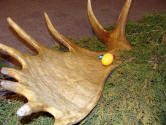 |
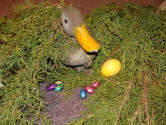 |
We attended the annual Easter Egg Hunt
in the Hansa Club just before the official holiday. I even ended
up with my very own basket from the Bunny, something that
reproduced feelings of childhood and cheer in me.
The hall was still very much decorated
from the night before, when the Hunting Club had a 30st
anniversary dinner with Elk Stew and the like. Of course, some
of the very big pieces of décor, like a huge wild cat, had
already been taken down and away, but there was still much left
over to hide an egg or two in.
A very delicious Streuselkuchen with
coffee was enjoyed by the grownups, the kids had arts and crafts
to do and a clown entertained them until the Easter Bunny
finally came around.
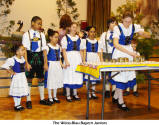 The
junior Weiss Blau Bayern youth group came to dance and play the
cowbells, which is always a delight. I understand that this year
not as many kids showed up, which was really no surprise,
because this time the hunt fell into March break. Especially
some of the older kids were on vacation somewhere.
The
junior Weiss Blau Bayern youth group came to dance and play the
cowbells, which is always a delight. I understand that this year
not as many kids showed up, which was really no surprise,
because this time the hunt fell into March break. Especially
some of the older kids were on vacation somewhere.
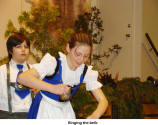 |
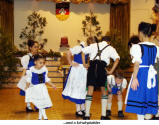 |
| Ringing the bells... |
...dancing a Schuhplattler |
It was a real pleasure watching this
mix of German and Canadian customs being practiced in that hall.
It made for a warm community feeling.
| Visits with the
Bunny |
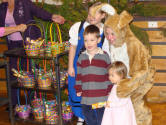 |
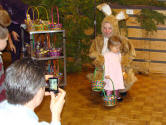 |
The Danube Swabians also had a big
Easter affair, you guessed it, at Easter. Personally I gave my
traditional Easter brunch for some close friends. There is
simply
 nothing
better than getting together with those we love to celebrate our
customary holidays with a special feast.
nothing
better than getting together with those we love to celebrate our
customary holidays with a special feast.
Until next time
Sybille Forster-Rentmeister
